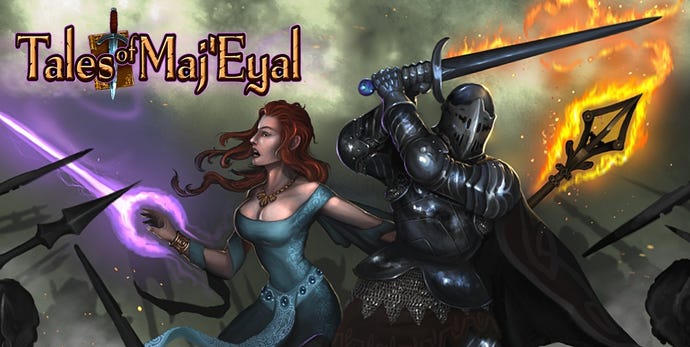Infinite Dungeons, Infinite Death: Tales of Maj'Eyal PC Review
One of the most well-established roguelikes ever made finally gets a Steam release.
This article first appeared on USgamer, a partner publication of VG247. Some content, such as this article, has been migrated to VG247 for posterity after USgamer's closure - but it has not been edited or further vetted by the VG247 team.
Tales of Maj'Eyal -- ToME to its friends -- has a rather long and convoluted history that predates the current fashionability of the roguelike genre by a considerable margin.
It began life back in 1990 as PernAngband, a rewrite of an Anne McCaffrey-themed spinoff to the popular open-source roguelike Angband. In 2002 it swapped the Pern setting for Tolkien's famous fantasy world, became known as Tales of Middle Earth and adopted the abbreviation it still uses today. In the subsequent years, it became well-known in the roguelike enthusiast community as one of the more experimental roguelikes out there, featuring, among other things, the opportunity to play as a sentient fungus that couldn't walk, and the ability to start life as a "Lost Soul" in a level 98 dungeon.
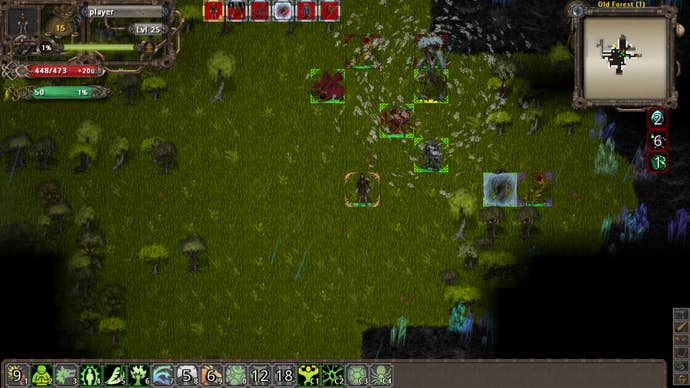
More recently, it has abandoned some of the more outlandish experimental features in favor of a more focused experience as well as ditching the Tolkien references altogether. It remains, however, one of the most well-respected names in the roguelike genre -- so much so that it became viable to release it as a commercial product, though you can still download it for free from the official website. With the growth in popularity of the roguelike genre in the past few years, it makes perfect sense for a game as respected as Tales of Maj'Eyal to come to a platform with much greater visibility than its own dedicated website -- and it's with that in mind that we come to the newly released Steam version, available now for a very reasonable $7.99.
Long-serving roguelike veterans are probably well familiar with ToME by this point, so to those people I'll just say that if you've always enjoyed the game and never donated any money in support of its ongoing development, the Steam version provides a great means of doing so as well as providing you with the additional benefits of Workshop support, cloud saves and achievements. You know what to do.
To the rest of you, let us go on a journey of discovery... and frequent death.
You'll begin your quest by being thrown straight into an initial dungeon crawl which usually involves caving in a monster's skull and then stealing their treasure.
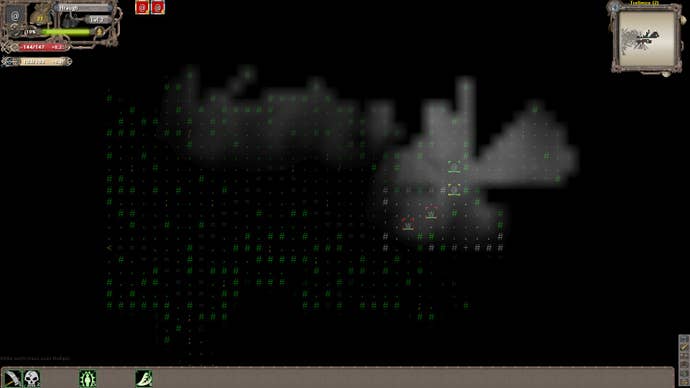
Tales of Maj'Eyal feels a little more structured than many other roguelikes, which simply plop you in a dungeon and tell you to get on with it. ToME, meanwhile, offers you some solid tutorials, followed by quests and guidance on where you should be going once you get into the game proper. You'll begin your quest by being thrown straight into an initial dungeon crawl, with the exact details depending on your starting race, but which usually involves caving in a monster's skull and then stealing their treasure. Once you've completed the initial quest, however, an overworld opens up and you can explore as you see fit -- but be sure to pay attention to your character's "feeling" about each level they enter; if it feels too dangerous, it probably is!
ToME supplements its dungeon-crawling and loot-whoring with some entertainingly written lore in the form of notes from previous adventurers that you'll gather as you explore, and there is quite a well-realized setting to explore as you progress through the campaign. Hints are often hidden in missives from past adventurers, too, so it's worth paying attention to those who came before you -- and considering what might have happened to them to cause their journal pages to become scattered all across a dungeon.
Plot aside, ToME is primarily about exploring, gathering treasure and bopping monsters on the head with a variety of different implements. As you progress through the game, you'll unlock new character races and classes, each of which has their own substantial skill tree to explore, though characters are often able to unlock additional skill trees from outside their specialism through completing random quests that pop up occasionally in the various dungeons.
In Exploration and Adventure mode, there are still consequences for flailing wildly into a seething mass of angry garter snakes but the punishment is less severe.
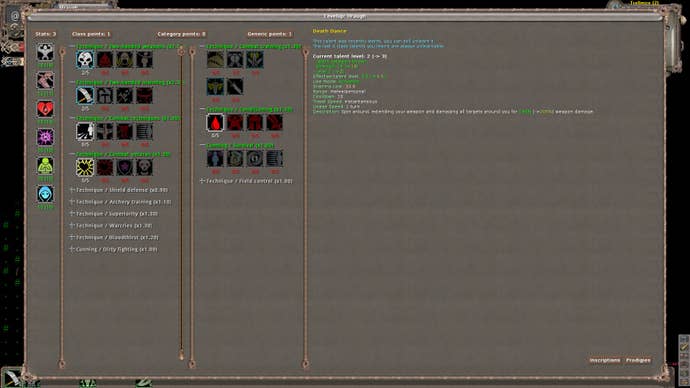
The variety of special abilities on offer makes each class feel very different to play. A Bulwark fighter, who focuses on using a shield to defend and stun their enemies, plays very differently from a Berserker, for example; leave the fighter classes and switch to a magic user and you'll find a completely different way to play again, and the options only become more and more diverse as you continue to adventure. Relatively few classes rely on straightforward hack-and-slash -- though it is an option if that's how you like to play.
With so much depth in character creation, ToME is a little more forgiving than most roguelikes in that it's not afraid to kill you off early and often, but also provides you with a couple of modes that don't jump straight to deleting your save file when the worst does happen. Exploration Mode allows you to resurrect as many times as you like, a la Diablo, while Adventure Mode gives you a stock of "lives" and allows you to earn more in various ways. In these modes, there are still consequences for flailing wildly into a seething mass of angry garter snakes, but the punishment is a little less severe, and a little more conducive to learning from your mistakes. Less chance of ragequit, in other words. For those who prefer the authentic permadeath experience, however, the appropriately named Roguelike mode is ready and waiting for you. Steam achievements honor your progress in each of these three modes separately.
Although accessible in gameplay terms, ToME may be something of a culture shock to those who haven't played an ASCII-based roguelike before. While the game does have a graphical, mouse-driven interface and an MMO-style hotbar for triggering abilities, the default visual style the game uses is stark, straight-up ASCII with a few additional special effects here and there.
The abstract presentation is actually very stimulating to the imagination.
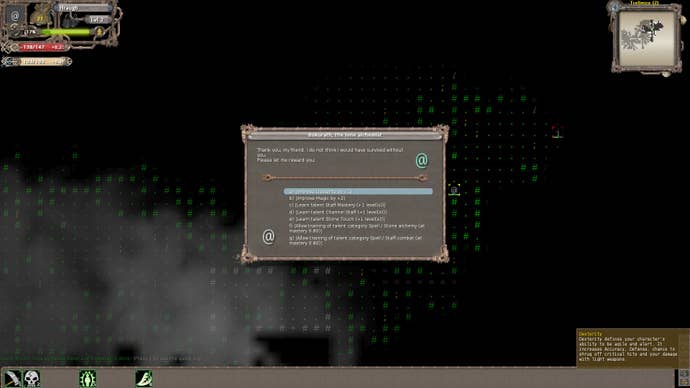
Give it a chance before you go hunting for graphical tilesets, though, because you'll find before very long that learning to deal with the abstract presentation is actually very stimulating to the imagination. There's just enough use of color to give you an idea of what you're looking at without spoiling the fun of filling in the blanks yourself; it actually becomes enormously atmospheric after a while, as you start picturing what life on the ground must be like for your character without having it explicitly depicted for you.
This is further helped by the game's capacity for emergent mechanics and narrative. Besides exploring, hacking and slashing, for example, there's nothing stopping you digging out a cave's walls to see if there's anything buried deep within the rock, or making creative use of your spells to get yourself out of a sticky situation, or even fumbling your way blindly along a dungeon's walls if, for whatever reason, you find yourself without a functioning light source. It's these surprising, unexpected moments and unforeseen consequences that have always made ToME such a joy to play. And with the game's online connectivity, you can share your most amusing stories with the community in real-time through the chat interface.
On the off-chance you do manage to actually finish the hefty main quest, the massively moddable nature of the game means that you can expand, change, tweak and poke the game to your heart's content, and even write your own modules for the community to enjoy. Pickings on the game's Steam Workshop page are relatively slim right now, but this is a situation that's likely to improve over time; elsewhere on the Internet, meanwhile, there are some highly creative examples of alternative modules for the game, many of which explore some interesting game mechanics. There are also new "official" campaigns in the works.
It's the surprising, unexpected moments and unforeseen consequences that have always made ToME such a joy to play.
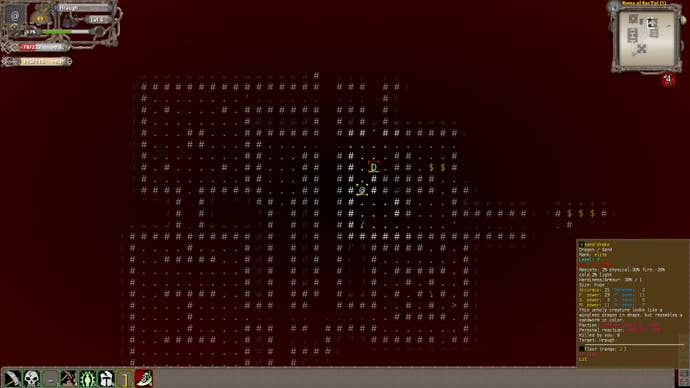
Even without the capacity for modding and expansion, though, Tales of Maj'Eyal would still be one of the very best roguelikes out there. If you've come to the genre relatively recently through accessible, enjoyable but simplified examples such as Dungeons of Dredmor, or even "roguelike-likes" such as FTL or Rogue Legacy, you won't regret graduating to ToME. Although complex, it's never overwhelming, and there's never the sense it's being obtuse for obtuse's sake; rather, it's a game with lofty ambitions that, for once, are mostly fulfilled -- a game that wants you to play it, enjoy it and continue discovering new things about it for many years to come.
The Nitty Gritty
- Visuals: Although graphics are practically non-existent on its default settings, ToME can be fully customized with a variety of different tilesets to make it look the way you want. Animation is minimal regardless of tileset, however, though there are some nice spell effects.
- Music and Sound: There's some catchy background tunes, but they'll become tiresome before long. Put your own favorite dungeon-crawling music on instead. I recommend some good metal, the cheesier the better.
- Interface: The interface is complex but easy to use, and you never feel like it's actively hiding information from you. Helpful tooltips abound when you hover the mouse over pretty much anything.
- Lasting Appeal: The game you get when you first install it is a fraction of the whole experience. Unlock new content by progressing and you'll find enough here to keep you busy for years.
ConclusionDeep, complex and infinitely satisfying, Tales of Maj'Eyal is the pinnacle of the fantasy roguelike as it exists in 2013.
